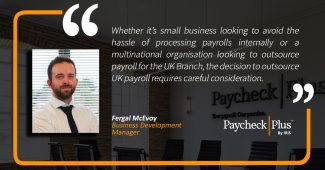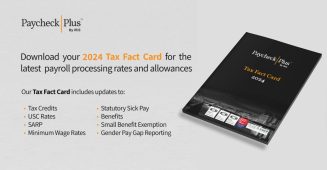
Irish Vs UK Payroll
Our Expert Payroll Providers Compare UK and Irish Payroll Processing
The Key Differences Between UK and Irish Payrolls
Payroll can be a complex and time-consuming task, especially for multinationals. Every country has their own specific legislative requirements that payroll providers must adhere to in order to maintain compliance. Even in neighbouring countries such as Ireland and the UK payroll processes can vary significantly and there are several key differences that employers should be aware of.
In this article we’ve outlined some of the most important differences between the Irish and UK payroll systems that your payroll providers should be mindful of.
| ROI | UK | |
| Tax year | Tax year begins on 1st January each year and ends on 31st of December | Tax year begins on 6th April each year and ends on 5th April of the following year |
| Place of Establishment / Registering as Employer | Any employer who makes payments exceeding a rate of €8 per week in the case of a full-time employee or €2 per week where the employee has other employment must register with Revenue for PAYE purposes.
Any company employing an individual resident and working in Ireland is obliged to register as an employer with Revenue even if they do not have a place of establishment in the state. |
Typically a non-resident company cannot set up a standard (PAYE) payroll scheme until it has a business premises in the UK. However there are certain exceptions.
The employer is responsible for calculation and submission or employer and employee National Insurance even when they do not have a place of establishment in the UK. |
| Filing Details | RTR – Real Time Reporting
With Real time reporting, Irish employers are required by law to submit a PSR on or before payday.
An employment detail summary is made available to all employees at the end of the tax year |
RTI – Real Time Information
All employers are required by law to submit an RTI return every time employees are paid either on or before payday. This is like a P35 being submitted weekly, fortnightly or monthly by UK employers. Full Payment Submission: The FPS contains a breakdown of the payments and deductions on the payroll for each person paid covering over 150 items for each person. Deadline for submission to HMRC is on or before each & every payday. Employer Payment Summary: The EPS contains any adjustments to payments such as the recovery of statutory payments and details of the employer’s PAYE and NIC liability for the relevant pay period. Deadline for submission to HMRC is 19th of the month. |
| Holiday/Public Holidays | Full-time employees are entitled to 4 weeks paid holiday entitlement as a minimum. Part-time employees receive the same entitlements pro-rata.
Depending on the time worked, an employee’s minimum holiday entitlement s should be calculated by one of 3 methods. There are 10 Public Holidays in addition to annual leave. With minimum annual leave being 4 working weeks. A full-time employee is entitled to one of three options for these days. To determine the relevant payment entitlement, different rules apply to people who are required to work on the public holiday and to part-time employees, depending on their ‘normal’ working hours/days and on the number of hours worked in the weeks leading up to the Public Holiday. |
Most workers who work a 5-day week must receive 28 days’ paid annual leave per year. This is calculated by multiplying a normal week (5 days) by the annual entitlement of 5.6 weeks.
Part-time workers are also entitled to a minimum of 5.6 weeks of paid holiday each year, although this may amount to fewer actual days of paid holiday than a full-time worker would get. For example; a worker works 3 days a week. Their leave is calculated by multiplying 3 by 5.6 which comes to 16.8 days of annual paid leave. An employer can choose to include bank holidays as part of a worker’s statutory annual leave. |
|
Benefits in Kind A Benefit in Kind (BIK) exists when an employee receives a benefit from an employer in a form other than a monetary payment. The term “notional pay” is used to describe the value of a BIK.
|
The majority of BIKs are liable to PAYE, PRSI (including employer PRSI) and USC however certain benefits are exempt.
Where an employee receives a BIK from his employer, the employer is responsible for identifying, calculating and collecting the liabilities due on the notional value of the benefit through the payroll system.
Taxable value of the car is based on Original Market Value of the car and business mileage.
|
Some benefits in kind will not be taxed while others may be subject to tax and National Insurance.
There are different rules for reporting and payment depending on the type of benefit or expense provided. HMRC have also introduced “payrolling for some benefits”. Where an employer provides company cars or fuel for employee’s private use the taxable value must be calculated and reported to HMRC. Taxable value of the car depends on such things as car’s fuel type and level of CO2 emissions. P11D Returns must be submitted annually with details of Benefits provided for each employee. |
| Pensions | Where an employee is not eligible to join a company pension scheme within 6 months of commencing employment, an employer must provide access to a standard Personal Retirement Saving Account (PRSA).
PRSA contributions due for the PRSA provider must be paid by an employer by the 21st of the month, after the month in which they were deducted. It is also worth noting that pension auto-enrolment legislation is expected to be introduced in 2024. |
From 2012 all qualifying employees must be automatically enrolled into a pension scheme by their employer.
Employees can choose to opt out of the scheme but they must be automatically re-enrolled three years later. From April 2017 even the smallest employers should have been given their staging dates. |
Paycheck Plus – Ireland’s Premier Payroll Providers
In addition to our Irish Payroll Services Paycheck Plus also provide an award winning UK Payroll Service to handle all of your salary calculations, tax payments, filings and much more. To ensure payroll compliance Contact Paycheck Plus Today.



